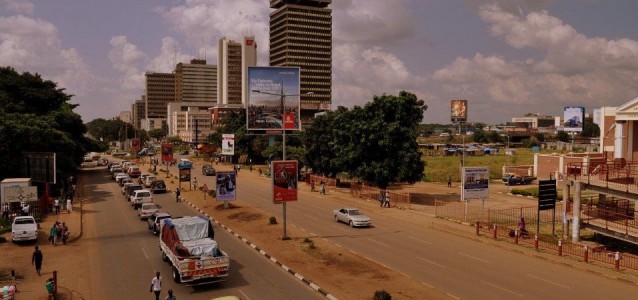Written by Brenda Mwalukanga (Lusaka Embedded Researcher)
 The Future Resilience of African Cities and Lands (FRACTAL) is a project that aims at understanding decision making around climate change in the context of the city system. It is a project that aims at merging climate science information with decision making practice in urban development and management, focusing specifically on water and energy in eight Southern African cities. It is funded through the Future Climate for Africa (FCFA) programme and managed by the Climate Systems Analysis Group at the University of Cape Town. In Lusaka, it is managed in a collaborative manner by the University of Zambia and Lusaka City Council. I come on board as a socio-economic planner at Lusaka City Council, seconded to work as the embedded researcher on the FRACTAL project in Lusaka for a period of 3 years.
The Future Resilience of African Cities and Lands (FRACTAL) is a project that aims at understanding decision making around climate change in the context of the city system. It is a project that aims at merging climate science information with decision making practice in urban development and management, focusing specifically on water and energy in eight Southern African cities. It is funded through the Future Climate for Africa (FCFA) programme and managed by the Climate Systems Analysis Group at the University of Cape Town. In Lusaka, it is managed in a collaborative manner by the University of Zambia and Lusaka City Council. I come on board as a socio-economic planner at Lusaka City Council, seconded to work as the embedded researcher on the FRACTAL project in Lusaka for a period of 3 years.
To be able to put across my excitement, I need to describe my location and the city that I hold dear in my heart… Lusaka. Basic data that can be obtained from Google or Zambia’s central statistical office reports will inform you that Lusaka is an urban city with a population of well over 2 million people. Other data packages or reports will inform you that Lusaka is characterised by informal and formal or planned settlements, with a majority of the population living in the informal settlements. But what the quick engine searches will not tell you is the personal stories on the water and energy crisis. What does the average Lusaka resident experience nearly every day with regards to water and energy? For most, in terms of water, it means dry taps for half the day or a long walk to draw water from a kiosk. Insufficient water supply is due to increased demand from a growing population and also due to infrastructure not matching the demands on supply. Often we don’t think of climate change as the immediate reason for the daily water and energy struggles. It’s very easy to point a finger at authorities and claim they aren’t managing and or adequately planning for the water and energy resources. One may even go as far as saying the decision making is made by institutions who engage in little, and in most cases no, collaboration or consultation.
Load shedding has inconvenienced not only my personal life in terms of having to wake up early to prepare food but also professionally as power is often disrupted at the office. But what has FRACTAL got to do with all this, you may ask? Why am I excited about joining this project? How will the FRACTAL project influence the negative impact of climate change on water and energy and possibly reduce the effects I suffer as an individual and professional?
I am excited as an individual because long-term adaptation plans and sustained collaboration for water and energy decision making through the learning labs will have a positive impact in reducing water supply risks and threats. From talking and networking amongst stakeholders, to action in the city around water and energy sustainability using climate change information to shape decision making, these are some of the ways the project will try to make a positive impact.
My excitement on a professional basis about joining the FRACTAL team and project is that I worked as a planner in the local authority for seven years. In all that time, I never came across a project that brings different clusters and disciplines of knowledge into one platform. To get the key players and institutions talking about the issues affecting water and energy that they are responsible for professionally and ultimately affected by as individuals excites me. The city is growing in population and size, and with expansion of a city comes increased complexity in administration, management and decision making in the water and energy sector in Lusaka. But with this complexity comes a need for transformation in the processes of decision making that may have worked for a less complex city system and that’s where FRACTAL comes in.
What excites me about FRACTAL is that it also attempts to introduce a new mode of decision making that is engaging and multi-disciplinary in approach. FRACTAL also aims to overcome the divisive line that often exists between the social and natural scientists, business community, civil society organisations, political representatives and government decision makers. FRACTAL aims to break down these divisions and create the space for the merging of data and information that is vital in climate change decision making, response and adaptation to achieve a resilient city system.
I am excited to join the FRACTAL project because twenty years from now, when I open my tap for water or flick the switch to turn on a light bulb, I will proudly remember that I was part of a project that aimed at reducing negative climate change impacts in the water and energy sectors for the city of Lusaka.
